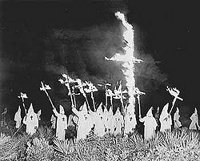"Sophisticated cyber-attack hits Energy Department, China possible suspect"It looks like the Energy Department's hack attack is about as serious matter as what happened to Sony Playstation back in 2011. (Apathetic Lemming of the North (April 26, 2011) Individuals were affected, and the organization had a public relations headache: but that's as far as the trouble went.
FoxNews.com (February 4, 2013)
"The Energy Department has been hit by a major cyber-attack, which resulted in the personal information of several hundred employees being compromised and could have been aimed at obtaining other sensitive information, The Washington Free Beacon reports.
"FBI agents are investigating the attacks, which happened two weeks ago, at the Washington-based headquarters. Fourteen computer servers and 20 workstations reportedly were penetrated during the attack....
Apparently hackers got information about Energy Department employees. That could be serious for the individuals involved, if folks who steal identities for fun and profit get it. Identity theft is a real problem, and a bit off-topic for this blog.
Politics, Editorial Views, and Motive
I'm not familiar with the Washington Free Beacon, but understand that it's editorial stance is "conservative." That might explain why the service was interested in posting this article: but doesn't mean that the hack attack didn't happen.Another Employer's Personnel Files Hacked: So What?
The Energy Department handles information that's a tad more important than usernames and passwords for online games. They're interested in solar energy, wind farms, nuclear weapons, and other energy-related tech. (More at energy.gov)I don't share the reflexive revulsion toward nuclear weapons, and unquestioning enthusiasm over solar power, expressed by some of my contemporaries. On the other hand, on the whole I'd rather have some technical details of America's nuclear weapons stay where it's supposed to be.
Back to that article:
"...While no classified information was compromised, the Free Beacon reports there are indications the hackers could have been seeking access to such data. Chinese hackers may be suspects, as the department is a known target of Beijing -- according to the Free Beacon, the sophistication of the attack indicates the involvement of a foreign government.Mr. McCallum might simply be an irate ex-employee, out to make trouble for his former boss, he may be an irate ex-employee who's legitimately concerned about a clueless former boss, or maybe there's another explanation for what he said.
"The department includes the National Nuclear Security Administration, which maintains nuclear weapons.
" 'It's a continuing story of negligence,' former Energy Department security official Ed McCallum told the Free Beacon, explaining that the department continues to have security problems despite controlling some of the most 'sophisticated military and intelligence technology the country owns.'..."
(FoxNews.com)
Old-School Skills, Information Age Issues
I think it's quite possible that whoever's making decisions at the Energy Department is well-meaning Washington bureaucrat: who is very good at managing paperwork; diligent in pursuing greater intradepartmental communication; and clueless about the Internet. Folks in top leadership positions tend to be a bit on the old side, and less than familiar with information technology:- "Why Your Boss Doesn't Understand the Information Age"
Starting a Small Business Without Losing My Mind (August 9, 2010)

In the real world, having a boss who doesn't understand why keeping a network safe from hackers could be a big problem.
Being 'Protected'
I think it would be nice if everybody could share information about anything, and do so without being concerned about anyone's safety. I also think it would be nice if everybody would be nice: but that's not the way the world is.Reality being what it is, there is a need for secrets: and weapons, and that's almost another topic. Folks who decided to kill several thousand people on September 11, 2001, were not nice. What's happened since strongly indicates that outfits like Al Qaeda and the Taliban are still determined to behave badly.
Sadly, they're not the only ones who threaten the safety of the rest of us.
China isn't the same country it was a half-century back: but its leadership still seems to be unwilling to accept folks whose ideas don't follow the 'party line.' China isn't alone, of course. It's easy to see disagreement as a threat.
I'm concerned about threats from outside America. I'm also concerned about Americans who want to 'protect' us from ideas they don't like. And that is another topic. (March 9, 2008)
Related posts:
- Internet security
- " 'Chinese Hackers' - - - And Keep Reading"
(March 1, 2012) - " 'Digital Sabre-Rattling,' "Complex Legal and Cultural Issues,'" and Heat-Related Deaths"
(July 15, 2011) - "IMF Hacked, Again - or - 'This isn't Cyberwar: It Just Acts Like Cyberwar'?!"
(June 11, 2011) - "China to Google: 'Shut Up Or We'll Hurt You' "
(June 6, 2011) - "China, Paper on How to Bring Down USA Power Grid: All a Big Misunderstanding?"
(March 20, 2010)
- " 'Chinese Hackers' - - - And Keep Reading"
- Freedom
- "Information Technology, People, and a Changing World"
(February 23, 2011) - "Blogs, Freedom of Speech, and Threats to the Status Quo"
(July 31, 2010) - "How to Shut Down the Internet - or - Dealing With Troublesome Ideas, and the People who Spread Them"
(December 7, 2009) - "DC Gun Ban, Online Censorship, Individual Rights, and Power to the People"
(June 27, 2008) - "Odd Allies: Opposition to Waterboarding and Web Censorship"
(March 9, 2008)
Particularly
- "Information Technology, People, and a Changing World"



